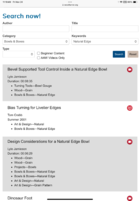looking forward to hearing what other books people find essential in the quest to master woodturning.
Learn to Turn by Barry Gros—great beginner’s guide
The Lathe Book by Ernie Conover—guide to understanding the lathe
Understanding Wood by R. Bruce Hoadley—exactly what the title is
Turned-Bowl Design by Richard Raffan—a master turner explains design
Ellsworth on Woodturning by David Ellsworth—another master turner
Woodturning with Resin by Keith Lackner—a bit specialized
Turning Wood by Richard Raffan—another book by this master, more elementary.
Turning Green Wood by Michael O’Donnell—what the title says
Band Saw Handbook by Mark Duginske—useful adjunct to turning.
Understanding Wood Finishing by Bob Flexner—the Bible in finishing.
Master Woodturners by Dale Nish—insight into some masters.
Learn to Turn by Barry Gros—great beginner’s guide
The Lathe Book by Ernie Conover—guide to understanding the lathe
Understanding Wood by R. Bruce Hoadley—exactly what the title is
Turned-Bowl Design by Richard Raffan—a master turner explains design
Ellsworth on Woodturning by David Ellsworth—another master turner
Woodturning with Resin by Keith Lackner—a bit specialized
Turning Wood by Richard Raffan—another book by this master, more elementary.
Turning Green Wood by Michael O’Donnell—what the title says
Band Saw Handbook by Mark Duginske—useful adjunct to turning.
Understanding Wood Finishing by Bob Flexner—the Bible in finishing.
Master Woodturners by Dale Nish—insight into some masters.
Last edited:

